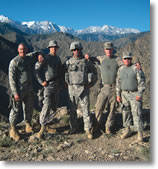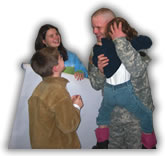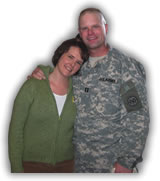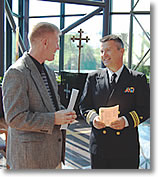by Sandy Wood
 |
|
Chaplain Alexander Knowles (center) with fellow soldiers in Afghanistan.Photo courtesy Susan Knowles |
Somewhere in your congregation there’s a good chance a mom struggles with sleep at night because she fears for her son’s safety in Afghanistan.
Somewhere in your community it’s likely there’s a child feeling isolated from his friends because he lives with the fears and stresses of war every moment that his dad—or mom—is away. No matter where you live, the families of members of the National Guard and Reserve are all around you, though you may not know they are there. And since 9/11, National Guard and Reserve members are no longer just “weekend warriors.” They are in Afghanistan, in Iraq, on assignment around the world, leaving families behind to struggle with the profound impact of separation.
Now, the LCMS program begun two years ago to minister to reserve chaplains—Operation Barnabas—is rolling out a second phase with an opportunity for LCMS congregations to become part of a network to minister to all reservists and veterans.
Great Potential
Susan Knowles says the Operation Barnabas network has the potential for impact for Guard, Reserve, and veterans’ families like nothing else she has seen, even in the military community.
She knows because her congregation in upstate New York, St. Peter Evangelical Lutheran Church, Lockport, was part of the pilot program for Operation Barnabas, and she has seen firsthand the dramatic effect it has had on lives.
And she knows because her husband, Rev. Alexander Knowles, pastor of St. Peter, is also a chaplain in the New York National Guard, and she and her children have been through his two deployments, first in Iraq and last year in Afghanistan. “During the first deployment my heart cried out for anyone to have an effective response to the needs of the military families isolated and scattered across our country,” Knowles says. “During this deployment it was my privilege to watch God create a new thing.”
Operation Barnabas is an initiative by the Ministry to the Armed Forces, operated under the auspices of LCMS World Mission.
Heading the Operation Barnabas effort is Chaplain Mike Moreno, who worked with congregations through the first phase designed to support military chaplains. Now, he is traveling the Synod, providing workshops to equip congregations to support all reservists and veterans.
 |
|
Chaplain Knowles and his children, Danae, 13, Alexander, 11, and Abigail, 5, celebrate his return from Afghanistan.Photo courtesy Susan Knowles |
In military families, “war never leaves their consciousness,” Moreno says. They wake up with it; they go to bed with it.
Moreno is an LCMS pastor who spent 10 years in parishes before active duty in the Navy. He was deployed in Iraq and taught at the Naval Chaplains School in Rhode Island. Now he is teaching congregations to use the resources they already have to minister to reservists and their families.
“Military families are actively looking for help,” observes Chaplain Mark Schreiber, director of Ministry to the Armed Forces. Their lives are on a roller coaster, before, during, and after a deployment, he explains. “Neighbors can send care packages filled with hygiene items and snacks, but the Church has the greatest Care Package ever given, the Gospel of Christ Jesus, our Lord and Savior. We are reaching out to our military community in the name of Jesus Christ with love, concern, forgiveness, and the certain hope of salvation. This Care Package from God is able to withstand all the strains of military life.”
The net effect is more than congregations just doing what they already do. The connections to military resources in the Operation Barnabas network allow churches to make what they already do best into something with broader impact. Congregations in the network also can share resources for the deployed and their families.
“We have had a far greater impact than we expected,” Knowles says.“Chaplain Moreno can give personal help in assessing the current resources and helping a congregation choose outreach that fits them and the local military community,” she adds. “He can help them become knowledgeable about what does and does not help the service members and their families. Then he can help them connectin a professional manner to the local military community so the military contacts can feel comfortable referring families to the congregation.”
That means, for example, if a mother of four breaks her arm while her husband is deployed, the military community can contact a congregation that belongs to the Operation Barnabas network, knowing that it has been trained, and get help to the family more quickly than if it had to search several places for help. And the congregation has an opportunity for ministry it otherwise might not have known about.
“When a service member needs help, there is often not time to go from person to person or church to church to find the resources in time,” Knowles says.
Complementing Other Efforts
 |
|
Susan and Alexander KnowlesPhoto courtesy Susan Knowles |
An important emphasis of the Operation Barnabas network is to complement, not compete with, what th emilitary is already offering.
Houston Crum is a team leader at the U.S. Department of Veterans Affairs’ Buffalo Vet Center. He is experienced in helping families of those deployed.
“Operation Barnabas can uplift spirits, provide for social and recreational activities, and enhance a sense of belonging for those who feel alone and disconnected,” Crum says. “Most other programs are limited to information and instruction, neither of which is especially uplifting. At its best, it can reach those people who would otherwise not use the resources they need to help themselves.
“The true value of Operation Barnabas is that it allows isolated families to be part of something. That inclusion is a wonderful antidote for feelings of abandonment,” Crum says.
And that’s what members of Knowles’ congregation established during the initial phase of Operation Barnabas. They called it Operation Enduring Comfort, and it began with a T-shirt.
Darla Bubar, the wife of an Iraqi War veteran, says, “This project began after my mom (Dianne Schultz) got the idea to make my daughter a T-shirt with her dad’s picture on it while he did his first tour in Iraq in 2003.”
From that idea came pillowcases with deployed soldiers’ pictures on them, Comfort Buddy dolls in likenesses of deployed loved ones, and, perhaps most important, Take-A-Break events, where families gather and children can bond in supervised activities while adults can relax with others who share their experience.
“I think it is critical that our LCMS congregations understand how valuable the Operation Barnabas network is to military families if we just take the effort together to be knowledgeable and be ready,” Knowles says. “Even a congregation that does nothing more but participate in the training and agree to be part of the network can have a big impact on one family because of the connections we can make.”
To Get Involved
 |
|
Photo by Frank Kohn, LCMS Board for Communication Services |
For more information on Operation Barnabas and Chaplain Mike Moreno’s (at right in photo) upcoming workshops, visit
http://barnabas.lcmsworldmission.org
For more information on Operation Enduring Comfort, visit www.enduringcomfort.org.
Web-Exclusive Stories |
|
| A ‘Greatest Generation’ Servant of Christ The Department of Veterans Affairs tells us that of the 16.5 million World War II veterans, only around 2.8 million remain. Journalist Tom Brokaw referred to them as the “greatest generation.” LCMS Chaplain Eric Erkkinen notes that one such servant of Christ is Chaplain Robert F. Rolf. Operation Enduring Comfort How a New York congregation helps ‘keep the home fires burning’ and serves as an example of the work of Operation Barnabas. |
|





